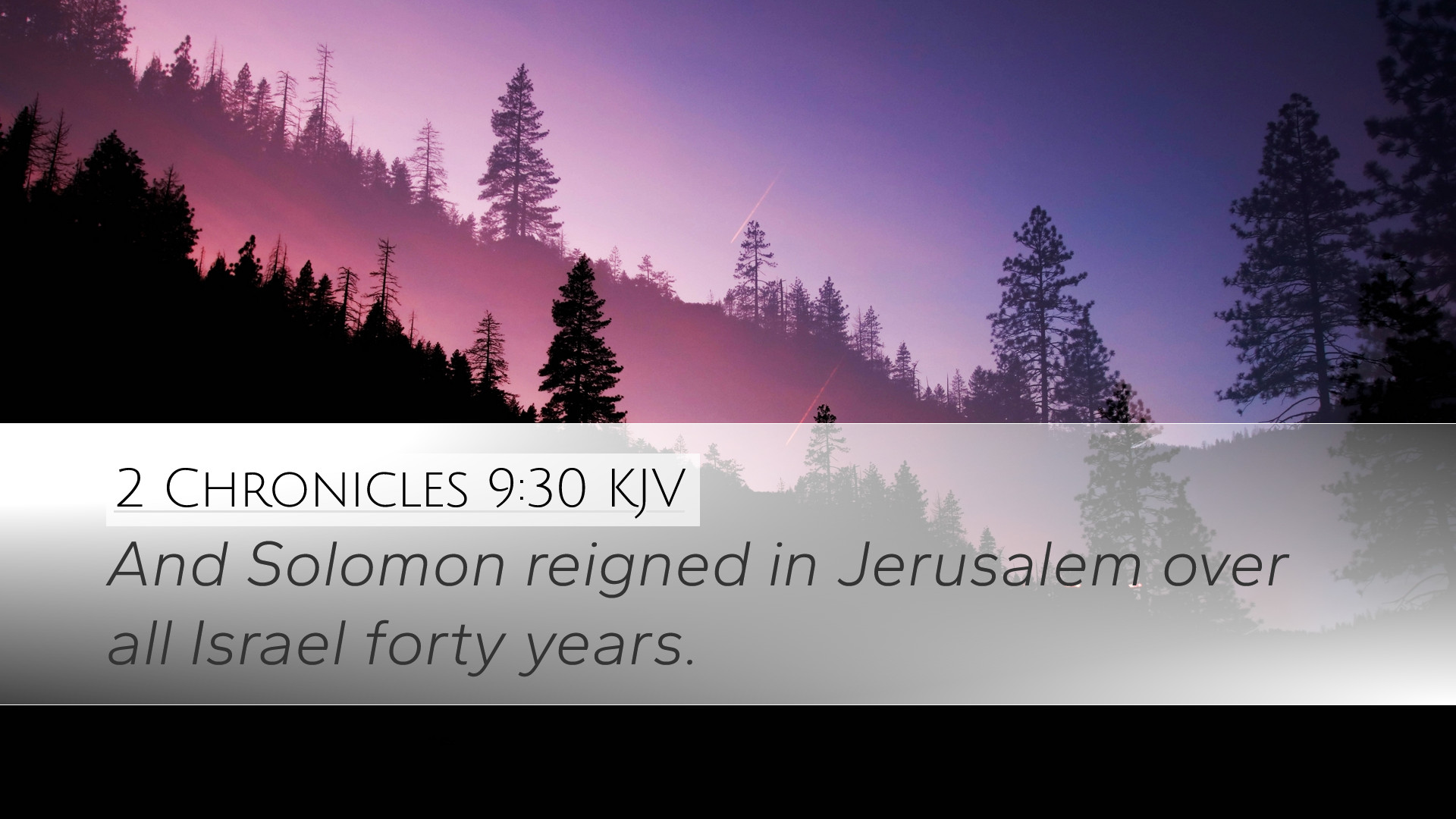Commentary on 2 Chronicles 9:30
2 Chronicles 9:30 states, "And Solomon reigned in Jerusalem over all Israel forty years." This verse reflects not only a historical fact but also encapsulates the theological significance of Solomon's reign, combining insights from various public domain commentaries.
Overview of Solomon's Reign
Solomon, the son of David, is renowned for his wisdom, wealth, and building projects, especially the Temple in Jerusalem. His forty-year reign is a pivotal period in Israel's history, marking both a time of prosperity and the eventual decline due to spiritual compromise.
Length of Reign
Matthew Henry emphasizes the intentionality behind the mention of the forty years. He notes that the duration of Solomon's reign represents a complete period, reminiscent of the Israelites’ wilderness wanderings which lasted forty years. This connection underlines how Solomon’s reign was a divine gift to Israel:
- Time of Peace: Solomon’s reign brought an era of unprecedented peace and stability, fulfilling the promises made to David.
- Preparation for worship: The peace allowed for the construction of the Temple, indicating that God's presence was to be centrally honored in Israel.
Theological Implications
Albert Barnes discusses the importance of leadership in Israel, particularly during a period when strong leadership was essential for the nation’s unity and identity. Solomon's reign signifies:
- God’s Faithfulness: The verse reflects God's faithfulness to David's line, ensuring Solomon's ascension as the rightful king.
- Divine Order: Solomon’s reign represents divine order and governance established by God's guidance and wisdom.
Main Themes and Lessons
According to Adam Clarke, several themes emerge from this concise statement, offering profound lessons for today's believers:
- The importance of wisdom: Solomon is celebrated for his wisdom, which underscores the biblical principle that true leadership requires divine insight.
- Human Frailty: While Solomon reigned for forty years, his later life serves as a cautionary tale about the dangers of turning away from God and the consequences of idolatry.
Historical Context
The historical context of Solomon’s reign is also crucial. It was part of a larger narrative concerning Israel's establishment as a nation with a central identity:
- Nation of Israel: Solomon’s reign was marked by the consolidation of Israel’s power and influence in the ancient Near East.
- Pivotal Moments: The dedicated construction of the Temple in Jerusalem was a significant moment that symbolized God's dwelling among his people.
Applications for Ministry and Scholarship
For pastors, students, and theologians, the verse serves as a springboard for discussions on leadership, divine providence, and the socio-political dynamics of ancient Israel:
- Leadership Qualities: It encourages reflection on the attributes essential for effective biblical leadership, especially in relation to wisdom and integrity.
- Warnings Against Complacency: It prompts a study of how even the wisest leader, like Solomon, can falter if not vigilant in faith and practice.
- Legacy of Faith: The verse calls for a consideration of what legacies are left in leadership and how they affect future generations.
Conclusion
In conclusion, 2 Chronicles 9:30 encapsulates not just a historical milestone but evokes essential theological themes relevant for today. From understanding God's providence to examining the complexities of human leadership, this passage invites ongoing reflection and study. Both the triumphs and failures during Solomon’s reign continue to instruct us in our walk with God, emphasizing the need for wise and faithful leadership grounded in a vibrant relationship with the Lord.


